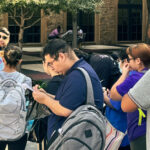The Quick Read: The senate decided not to recommend a modified grading system to administrators because survey results showed there wasn’t overwhelming faculty support at this time.
Survey results
History Professor Ed Westermann presented the idea to add a plus or minus to final grades at the Feb. 2 senate meeting, which he said would allow more students to participate in honor societies, spark motivation and differentiate performance in the classroom.
The results of the survey, conducted by the senate via SurveyMonkey, surveyed full-time faculty and adjunct faculty. Results showed faculty was split about 50/50.
Those who were surveyed were 54.1 percent full-time faculty and 45.9 percent adjunct faculty. Results were also broken down by schools: 36.5 percent were from the School of Arts and Sciences, 29.4 percent from School of Business and 35.3 percent from School of Education and Kinesiology.
“It looks like there isn’t overwhelming support at this time,” Westermann said in conclusion, adding that as the University matures, the senate may be able to recommend incorporating the modified grading system later.
Westermann also noted that many faculty members may not have understood the system because they hadn’t had much experience, which Westermann said was surprising to him.
Some members commented on the survey saying it would make it hard for the instructor to incorporate the +/-.
He said faculty members don’t understand that it affects a student’s grade-point average.
Megan Wise de Valdez, senate president-elect and biology professor, suggested the senate find a way to further educate faculty members on the grading system.
Dr. Richard Green, senate president and business professor, said, “The reality is that we cannot make the change at this time.”
He noted two reasons: the University doesn’t have control over Banner and the University is “frozen until SACS accreditation goes through.” The University is pursuing its accreditation through Southern Association of Colleges and Schools.
The senate moved to resolve the proposal with no recommendation.
Additional comments:
• If it ain’t broke, don’t fix it.
• Having taught at other universities with a +/- grading system, my experience has
been that it allows greater ability to differentiate between the performance of one
student versus another. Additionally, students seemed much more satisfied with
that grading system.
• If this doesn’t impact the GPA, I see no reason to change.
She told the senate that after the committee finalizes the draft, Snow will send it to school heads to incorporate their input. Then, it will be submitted to the senate for the final OK to recommend to University administration to recommend to the Board of Regents.
The final draft will be posted on the Intranet for all faculty members to view, Wise said.
But kinesiology Professor Patricia Holmes said the senate should be prepared for backlash. She expressed concern that there isn’t a tenured faculty member on the committee and that tenured faculty members won’t be able to see the draft before it’s approved.
Following was an an assertion from Wise, who said faculty should attend senate meetings to voice their opinions, and Holmes who argued that the senate has too much administrative influence.
Wise said “Faculty should come to the meeting.” In previous meetings, Wise has noted the absence of faculty attendance outside senate participation.
Holmes said, “I’m going to voice this as the only tenured faculty — someone that is tenured faculty should be in on this process .… It’s not affecting any of you; it’s affecting us first.”
Wise said the document “needed to be in a much more final form” before reviewed.
But Holmes interrupted: “It’s put together by administrators, period; no if, ands or buts about it.”
She continued: “Am I going to vote against it? Why would I waste my time voting against it if it’s going to them (administrators) again.”
“That’s the way the faculty in my school feel; like the senate is being run by the administration. To me it’s not a faculty senate, it’s an administrative senate.”
Wise asked Holmes what she would like to see happen to streamline the process of documents drafted by the senate.
Holmes said she’d like to see the draft. “I’d like to say to my faculty ‘How do you feel about it?’“
Wise noted that 200 people can’t create a document.
Green attempted to settle the discussion by saying the senate would follow the procedure. He said once there is a draft, the senate will have to distribute it to faculty members before they send it to the Board of Regents.
Then, he said the senate will have to call a senate meeting that is specific to address this issue, where faculty members who attend can voice opinions.
“I’m talking politics and perceptions,” Green said. Even though the faculty that Holmes described may perceive the senate as being “studious of administration,” Green said, “I know that’s not true because I’m arguing with administrators on a regular basis.”
Westermann asked if school heads would be prohibited to distribute the draft to their faculty members. He suggested if school heads can share the draft with faculty when they receive it, the review process would start at that time.
Holmes was in favor of the suggestion noting that “this is a very important document.”
“One day it will be important for you,” she said, adding that if the process is approved, she could be up for tenure review in two years.
Wise said during this time, she wanted to clarify the senate’s function when they are asked to create a document and make recommendations.
“My understanding is that the function of Faculty Senate is to make advisory suggestions on behalf of the faculty to administration,” adding that regardless if the senate has all faculty in favor of a decision, “we are still at the mercy of administration.”
The senate concluded that school heads would be able to distribute and discuss the draft of the tenure review process with faculty members. Then, the senate will conduct a specific meeting for the process.
In the midst of this concern, Dennis Elam, senate secretary and business professor, expressed another concern that wasn’t on the agenda.
Although senate documents are being posted on the Intranet site, Elam said faculty will not be able to view them because the senate’s site isn’t easily accessible.
According to the University website, the Intranet is open to faculty and staff. To access the Intranet, directions are offered on the site to log in with the same username and password to access a University computer.
The senate had further concern with the entire website agreeing that it is difficult to navigate through and find certain Web pages like the senate page.
“When you can’t find us, that adds to the suggestion that we’re not a real independent group,” Elam said. “This is a gigantic issue that the Faculty Senate should engage in.”
Technology use in Faculty Offices
Green said he would present the facts of the final three items briefly, then tabled them because presenters were not in attendance.
One item on the agenda posed the question of a policy for faculty to use private electronic devices.
Green said a faculty member in the School of Business had a private network hub in the faculty member’s office. While he was not on campus, Green said, “A person from information technology went to our department secretary and basically coerced her into unlocking the faculty office.” Then, the IT staff member “ripped out the equipment … pulling the wires,” which Green said was how it was described to him.
Green said the IT personnel took the device to Syed Harun, business professor and school head, and said it was illegal for the faculty member to have it in an office.
In an effort to clarify the situation brought about by the agenda item, the Mesquite contacted Rick Trefzer, assistant vice president for finance and administration, and Ravi Kallianpur, director of information technology services, March 2 and asked for information on the incident as well as any documented policies.
He said an ITS staff member was able to locate two unauthorized networking devices connected to the Brooks Campus network — a network hub and a wireless access point.
The statement indicates: “Two ITS staff members approached the departmental representative and informed her about these unauthorized devices; they requested access to the room to review the potential security breach, and requested that the department representative accompany them, both of which the departmental representative gladly did.”
The ITS staff members proceeded to disconnect the equipment from the network, complied and handed the equipment to the department chair.
In the statement received via email March 8, Kallianpur said, “Informations Technology Services is charged with monitoring and securing our networking infrastructure.”
IT defined the policy as unrelated to issues of privacy.
The statement concluded: “This policy is based on State of Texas TAC 202.75 information technology security requirements, which we are required to comply with. Devices such as the one that was connected advertise as a Wireless Access Points, which others could join into or break into, thus compromising the security and integrity of campus data communications.”
Unaware of the policy at the time of the March 1 meeting, Green said as public employees, “We can’t assume that our offices are private,” but questioned the need for a policy to address situations like this.
Wise agreed, noting two separate instances in which she thought privacy issues were at stake. “There’s an issue of, are faculty members’ offices private?’”
Green said this agenda item led to a discussion of who has the right to enter a faculty member’s office and under what conditions such entrances can be made.
The senate concluded the discussion and tabled the item.
The final agenda item was the implementation of rules pertaining to graduation: need for final semester residency, incomplete coursework at the time of application for graduation and CLEB testing for foreign language requirement.
Frantzen, who brought up the item, was absent and, therefore, the senate tabled the item.
The next senate meeting will be at noon April 5 in the small auditorium of Brooks City-Base Campus.






